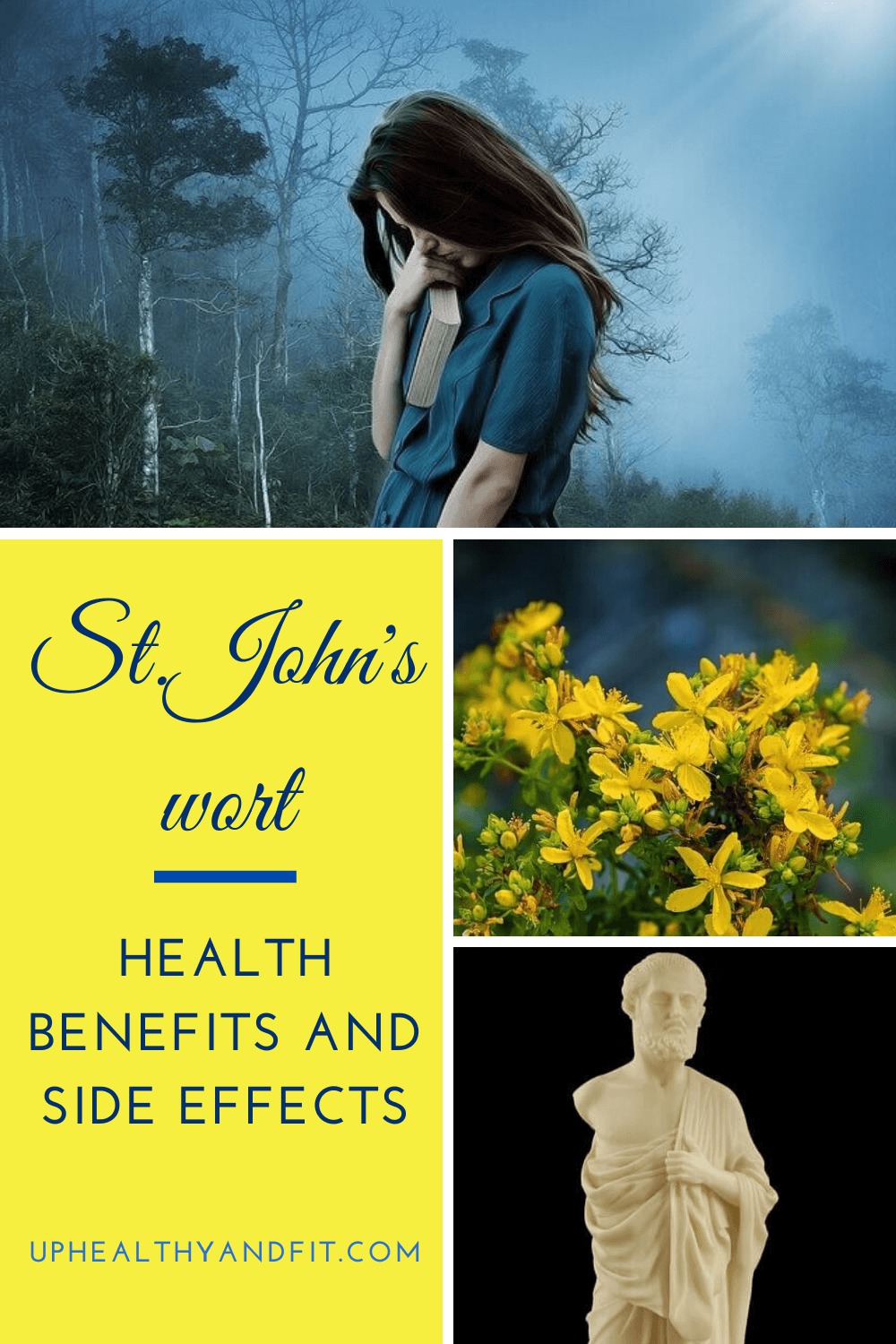Native to Europe, Western Asia and Northern Africa, though it is spread everywhere now, Hypericum (Hypericum perforatum) or St John’s wort is a perennial plant used for centuries in popular medicine, to heal burn, wound, skin inflammation and also mild depression and anxiety.
St. John’s wort has been known and used for its health benefits since ancient Greece: Dioscorides (a Greek phycian who lived in I a.C.) recommended it to drive off evil spirits. Actually he realized St. John’s wort was a mood booster!!! Before him, Hippocrates (IV b.C) suggested Hypericum extracts to soothe jaundice, cold, insomnia and hysteria.
Paracelsus, a Swiss physician of the sixth century, suggested St. John’s wort to cure anxiety, depression and neurological issues; topically it was recommended to heal wounds and burns.
In the Middle Ages it was hung onto house doors and windows to drive off demons, nightmares and ghosts.
St. John’s wort flowers and oil
St.John’s wort composition
You find several active substances in the plant:
- hypericin,
- hyperforin,
- flavonoids,
- sterols,
- tannins,
- chlorogenic acid,
- vitamin C and A,
- coline.
St. John’s wort health benefits

The most known use of St. John’s wort is for depression, though there are other mood issues on which this plant has shown valuable effects:
- pre-mentrual syndrome,
- seasonal affective disorder,
- menopause-related mood disorder.
St.John’s wort oil
Hypericum, has proved helpful topically in a few cases of:
- Burn,
- Atopic dermatitis
- Psoriasis,
- Sun burn,
- Muscle ache.
St. John’s wort and depression

You can find more and more scientic evidence on the effectiveness of St. John’s wort on short term mild to moderate depression treatment: this plant proved to be comparable with tricyclic antidepressants and Selective Serotonin Reuptake Inhibitor antidepressants, though showing fewer side effects.
Mechanism of action
St. John’s wort mechanism of action in treating depression is not clear: hypericin and hyperforin, two substances of hypericum, seem to be responsible for the biological mechanism of this plant, though more research is needed.
According to research, hypericin seems to inhibit monoamine oxidase (MAO). It is known that serotonin is the main brain chemical involved in regulating mood: boosting serotonin available amount is one of the strategies to battle depression. In order to do so, you may affect a few mechanisms: one of these is to inhibit monoamine oxidase (MAO)- actually a class of antidepressants, known as MAO inhibitors, tap into this type of mechanism.
Another level of intervention is to inhibit the serotonin reuptake by neurons: once its action is done, serotonin- as with other brain chemicals- gets reuptaken in the presynaptic terminal (synapsis is the connection point between a neuron and another), then to be used again when necessary. By inhibiting this mechanism, the availability of this brain chemical increases- thus, its action gets boosted. Serotonin Selective Reuptake Inhibitors (SSRI’s)- another important class of antidepressants- tap into this mechanism.
A few studies pointed out hyperforin may inhibit serotonin (dopamine, noradrenaline and GABA) reuptake, thus working as the antidepressant drugs mentioned above do.
Yet, as hypericum works also without hyperforin, it is conceivable that the antidepressive effect is due to the synergical action of more bioactive substances, working with several mechanisms of action. Actualy, recent research seems to prove this hypothesis: hyperforin, hypericin and flavonoids work synergistically to soothe depression symptoms.
It is essential to remind, depression mechanism hasn’t been fully understood yet. For years now it has been known brain chemicals deficiency may not be the only mechanism involved, as depression is also related to inflammatory and oxidative stress phenomena: in 40-50% of patients suffering from depression, you can detect proinflammatory cytokines -tumor necrosis factor alpha (TNF-α,), adrenocorticotropic hormone (ACTH) and cortisol, which are chemicals secreted in response to stress. A recent study showed both hypericum and fluoxetine (an SSRI antidepressant) drastically lower ACTH, cortisol and tumor necrosis factor alpha (TNF-α) levels, and normalize the activity of antioxidant enzymes in the hyppocampus and hypothalamus brain areas.
These findings show the tight connection to the immune, antioxidant and neuroendocrine systems and back up the assumption according to which hypericum- like many antidepressant drugs- work with several mechanisms of action.
Dose
Dry herb: 350-1800 mg a day is the range usually adopted in clinical trials
Mother tincture: 20-50 drops thrice a day
Dry extract standardized: 0,5-2,7 mg of hypericin a day
In case of depression, the effect starts to show up after 2-4 weeks; yet, more time may be needed to get the best effectiveness.
Note: after prolonged use, in case of treatment discontinuation, dose gradual reduction is recommended.
St. John’s wort side effects

Dry extracts and mother tinctures are generally well-tolerated, even by elderly patients.
Minor side effects, which may be skin rush, nausea, weakness and agitation had a rate ranging from 2,4 to 7,4 % of the treated.
It is not recommended to use St.John’s wort during pregnancy, nursing and in pediatrics.
Avoid the concomitant use of St.John’s wort and SSRI’s and tricyclic antidepressants, in order not to run the serotonin syndrome risk.
St. John’s wort might inhibit the effectiveness of benzodiazepines, birth-control pill, anticonvulsivant drugs like carbamazepine and phenobarbital, digoxin (sold under the brand name Lanoxin among others, is a medication used to treat various heart conditions), Nifedipin (vasodilator), Omeprazol (antiacid), Oxicodon (opioid analgesic) and migraine medications.
As concerns photosensitivity caused by hypericin, 2 cases were documented: the first one in a subject who used St. John’s wort for 3 years, whereas the second one in a 35-year-old woman who, after a 4-week treatment developed neuropathy; in both cases the symptoms subsided after the treatment discontinuation. Other studies prove photosensitivity shows up with doses larger than the recommended one.
Among major St. John’s wort side effects, we mention a few cases of “mania” (a 20-year-old patient suffering from maniac depression- who had replaced the prescribed therapy for bipolar disorder with St. John’s wort, taking 90mg a day, showed an episode of extreme agitation, irritability, anxiety and insomnia).
Conclusion
Ancient Greece physicians like Hyppocrates and Dioscorides knew St. John’s wort (Hypericum) health benefits very well, since they recommended its use to cure cold, insomnia and hysteria. Centuries later Paracelsus suggested St. John’s wort to cure depression and anxiety and, if used topically, wound and burn.
Nowadays you can find more and more scientic evidence on the effectiveness of St. John’s wort on short term mild to moderate depression treatment: this plant proved to be comparable with tricyclic antidepressants and Selective Serotonin Reuptake Inhibitor antidepressants, though showing fewer side effects.
It is not recommended to use St.John’s wort during pregnancy, nursing and in pediatrics.
Avoid the concomitant use of St. John’s wort and SSRI’s and tricyclic antidepressants, in order not to run the serotonin syndrome risk.

